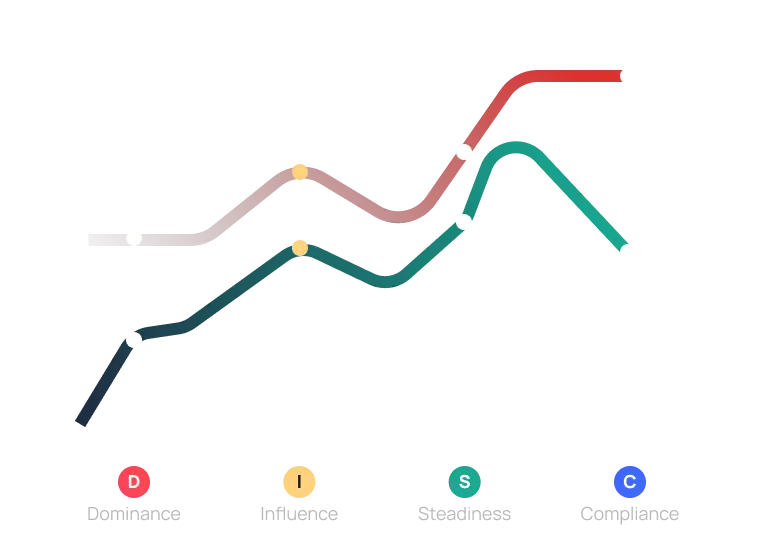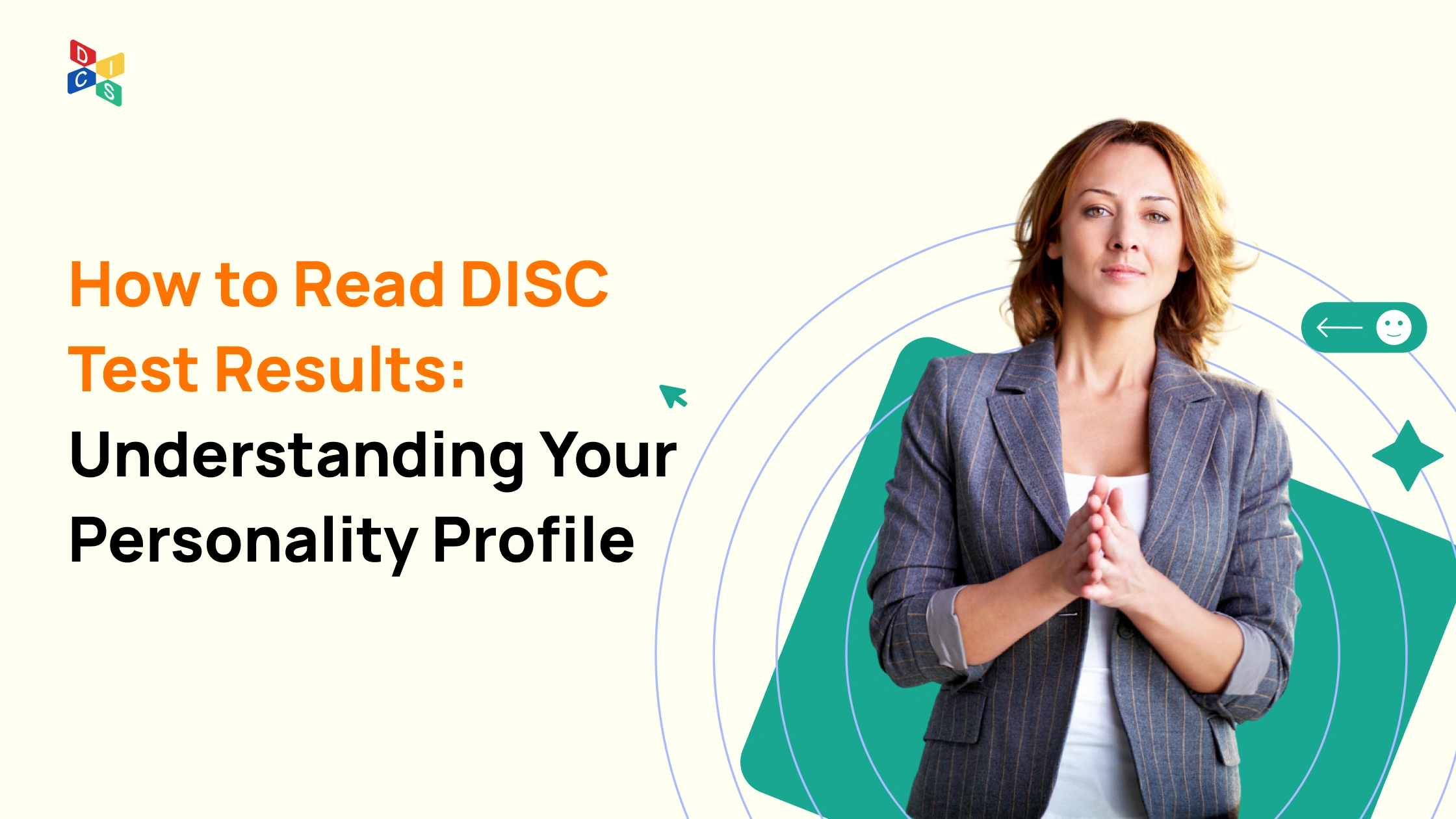Table of content
DISC vs MBTI: What Are The Differences Between Them? 2025 Guide
What are the differences between DISC vs MBTI? A detailed comparison helps you choose the right test. Explore now to understand your personality and strengths.
DISC vs MBTI are two popular personality assessment models, but they have several key differences. Understanding the differences between them will help you better explore your true self. Let’s find out which model suits you best!
What Is The DISC Test?
The DISC Personality Test is a behavioral assessment tool which identifies communication styles, behavior patterns, and individual strengths.
DISC differs from traditional assessment tests because it focuses on observable behaviors. The test also reveals a person's tendencies and responses to specific situations. From handling challenges and influencing others, DISC can delve deeply into people's psyche, suggesting both strengths and weaknesses.
If you're wondering who created the DISC assessment, it was first introduced by psychologist William Moulton Marston in the late 1920s. While Marston laid the theoretical foundation, the modern DISC assessment used in workplaces today was later developed by industrial psychologist Walter Clarke.

The DISC model divides personalities into four main types: Dominance, Influence, Steadiness, and Compliance.
- Dominance (D): Defined by decisiveness, strength, and a focus on results. Dominant individuals tend to be direct, challenge-driven, and big-picture thinkers.
- Influence (I): Characterized by strong communication skills, optimism, and persuasive abilities. These individuals are enthusiastic, sociable, and enjoy teamwork and building positive relationships.
- Steadiness (S): Known for sincerity, patience, and reliability. This DISC type is calm, cooperative, and prefers stability over sudden change.
- Compliance (C): Focused on accuracy, logic, and high standards. Compliant individuals often work by themselves to maintain quality and precision.
Discover More: What Do The Letters in DiSC Stand For?
What Is The MBTI Test?
The MBTI personality test also serves as an assessment tool. It is based on Carl Jung's psychology theory and stands for Myers-Briggs Type Indicator. Jung believed that intuition, sensing, thinking and feeling are four core forces shaping human behavior.

The MBTI test includes over 100 personal questions. Each question is designed to assess a person based on four key dichotomies:
- Introversion (I) vs. Extraversion (E) – How you focus your attention
- Sensing (S) vs. Intuition (N) – How you take in and process information
- Thinking (T) vs. Feeling (F) – How you make decisions
- Judging (J) vs. Perceiving (P) – How you interact with the outside world
By understanding each category, you can gain deeper insights into how you think, work, and relate to others.
Similarities Between DISC vs MBTI
These are popular personality assessment tools. They analyze human behavior based on different criteria. What's more, the tests reveal an individual's personal traits, strengths, and communication style.
DISC vs MBTI are widely used by both individuals and organizations. Specifically, the tests are vital for recruitment, training, and employee development. Experts have found the correlation between two assessment tools (MBTI DISC correlation) by creating a conversion map.

Differences Between DISC vs MBTI
Differentiating between the two tests will become easier with the comparison table below:
| Comparison criteria | DISC | MBTI |
| Function | Identifies behavioral styles | Identifies psychological preferences of an individual |
| Number of Questions | Includes 24 - 30 questions | Up to 90 - 100 questions |
| Purpose | A test to assess behavior, especially in the workplace | A test to determine a person's preferences and psychology |
| Validity | Has high scientific validity | Not considered scientifically valid |
| Characteristics | Represents Dominance, Influence, Steadiness, and Compliance | Represents Extraversion vs. Introversion, Sensing vs. Intuition, Thinking vs. Feeling, and Judging vs. Perceiving |
With the comparison table above, let’s dive in more details between the tests.
DISC vs MBTI: Test format
The number of questions in the tests differ significantly. DISC typically includes 24 - 30 questions, whereas MBTI is longer, with 72 - 100 questions. DISC gives quick insights into behaviors, while MBTI explores personal traits and ways of thinking.

Personality types in DISC vs MBTI tests
MBTI classifies people into 16 personality types based on four key factors:
- Extraversion (E) vs. Introversion (I): Extraverts enjoy socializing, while introverts value privacy and personal reflection.
- Sensing (S) vs. Intuition (N): Sensing types focus on details, while intuitive types see the big picture and deeper meanings.
- Thinking (T) vs. Feeling (F): Thinking types make decisions based on logic, while feeling types consider human factors more.
- Judging (J) vs. Perceiving (P): Judging types prefer organization and planning, while perceiving types are more flexible and adaptable to change.
DISC focuses on four main behavior styles. This personality test reflects how people act and interact with their environment:
- D – Dominance: Dominant individuals are strong, decisive, and often take on leadership roles.
- I – Influence: Influential types are outgoing, enthusiastic, and enjoy making an impact on others.
- S – Steadiness: Steady types are friendly, reliable, and focus on building lasting relationships.
- C – Compliance: Compliant individuals focus on accuracy, logic, and following principles.
Learn More About Yourself With IQ Test With Us
DISC vs MBTI: How results differ
MBTI helps individuals gain a complete self-understanding. It not only reflects behavior but also explores interests, motivations, and hidden strengths. Thus, MBTI is often used in career guidance, personal development, and building relationships.
Meanwhile, DISC focuses on analyzing behavior and how people interact with their environment. This test helps improve communication skills, teamwork, and work performance. DISC's visual charts allow individuals and organizations to identify different behavior styles.

Application Of DISC vs MBTI Test In The Workplace And Life
From DISC archetypes and MBTI 16 personalities, there are 3 distinct applications in life and work.
In recruitment and human resource management
DISC helps businesses recruit and place employees effectively.
For example:
- Group D, decisive and suited for leadership and sales;
- Group I, creative and ideal for marketing and communications;
- Group S, calm and a good fit for HR and customer service;
- Group C, logical and detail-oriented, perfect for IT and data analysis.
MBTI helps employers know the candidates' personalities, attributes and if he is suitable for the company culture. In employee management, it helps check and analyze individual traits, placing staff in suitable roles. This approach helps build effective teams and guide career development.

In personal development and career guidance
DISC helps businesses recruit and place employees effectively.
For example:
- Group D, decisive and suited for leadership and sales.
- Group I, creative and ideal for marketing and communications.
- Group S, calm and a good fit for HR and customer service.
- Group C, logical and detail-oriented, perfect for IT and data analysis.
MBTI helps employers know the candidates' personalities and attributes. With MBTI, employers if their dynamics fit the company culture. The test also helps in placing staff in suitable roles based on distinct traits. From that, managers can build effective teams and guide career development.
In communication and teamwork
DISC: Identifying individual behavior is key in the workplace. For example, someone with a "Dominance" style may like making quick decisions, helping the team adjust and work more efficiently.
MBTI: Each person has a different communication style. For example, introverts may prefer writing, while extroverts tend to speak more.

Should You Choose DISC Or MBTI?
Research reveals DISC is better for understanding group dynamics at the workplace. In contrast, MBTI helps individuals explore personal interests and career orientation. So, which tools should we use for specific situations?
When should you take the DISC test?
- You want to improve team collaboration, such as in training or team-building sessions.
- You need to resolve conflicts or understand team dynamics.
- You’re evaluating leadership potential or developing communication skills in a professional environment.
For example, a company can use DISC in team-building to help everyone understand each other’s behavior and work better.
| Check out our DISC business suite for recruitment solutions! |
When should you take the MBTI test?
- You want to understand your personal preferences, work approach or learning.
- You’re planning your career to find the right field for your personality.
- You’re focused on self-development, such as identifying strengths and weaknesses to improve.
For example, many universities utilize the MBTI test in their career counseling. Students take the test to choose a suitable major based on their personality. If they are more creative (Intuition), they can follow creative fields. If not, they can pursue a more information-driven major since they are the Sensing type.
Conclusion
With the information above, have you understood the differences between DISC vs MBTI? These are two popular personality assessment tools for career guidance and self-discovery. We hope this article has distinguished these two tests to help you choose the one that suits your needs!
Don't forget that you can take the DISC personality test AT NO COST. Feel free to explore more about personality test insights at discpersonalities.com
Frequently Asked Questions (FAQs)
Q1. What are the key differences in functionality between DISC vs MBTI?
DISC filters behavior through four specific groups, opposed to four pairs of dichotomies of MBTI.
Q2. Can DISC and MBTI be used together?
Absolutely! The tests can complement one another. DISC helps assess behavior in specific situations, while MBTI explores thinking processes. When combining the two results, test takers will understand their nature more comprehensively.
Q3. How do DISC vs MBTI help in personal skill development?
DISC helps improve communication, teamwork, and leadership, while MBTI explores thinking, preferences, and decision-making for better career and personal growth.
Q4. Which one is better for hiring – DISC vs 16 personalities?
DISC is generally preferred in hiring because it highlights observable workplace behavior and communication tendencies. MBTI provides deeper psychological insight but is more suitable for coaching than selection processes.


Don't Let Your Potential Stay Hidden!
Take the DISC test today and discover your unique 'YOU', with deep insights into your true personality and potential.

Represents your instinctive behaviors and desires.
Shows the behavioral tendencies you think you should exhibit in specific situations.
Related articles
You may also be interested in
 DISCJan 06, 2026
DISCJan 06, 2026DISC Personality Test for Sales: Unlock Your Team’s Full Potential
DISC Personality Test for Sales helps sales teams improve role fit and performance. Learn how DISC boosts hiring, coaching, and customer alignment.
 DISCJan 06, 2026
DISCJan 06, 2026How to Read DISC Test Results: Understanding Your Personality Profile
Learn how to read DISC test results and understand your personality profile. Discover how DISC can enhance communication, teamwork, and career growth.
 DISCDec 31, 2025
DISCDec 31, 2025What Is Group Culture? How Team Behaviors Shape Workplace Success
Discover what is group culture and how it shapes team dynamics, decision-making, and performance. Learn how the DISC model can help improve your team’s culture.
